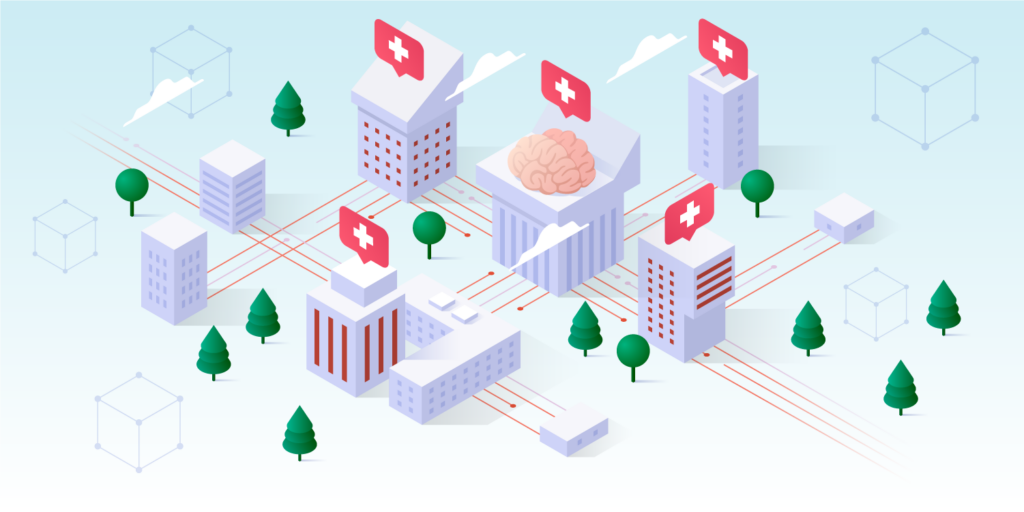by Curt Ecott
Introduction
Thanks to companies like Microsoft and OpenAI, an independent research organization, Artificial Intelligence (AI) is a technology that everyone can use, even from the palm of their hand. However, while AI is now the new buzzword, harnessing it within the Government Tech Healthcare sector brings potential advantages and associated challenges. This article explores both the positive and negative aspects of AI and showcases unique use cases.
Challenges
In the ever-evolving landscape of government healthcare technology, using advanced tools and techniques is crucial so governments can provide efficient and effective healthcare services. As of September 2023, over 700 use cases were identified by agencies working on projects across 27 government departments.
AI can benefit this space with almost limitless potential, especially when using large language models (LLMs). These models are trained on large amounts of data from various digital sources to generate human-like responses to language-based queries.
These LLMs use deep learning techniques like neural networks to understand the structure and meaning of language. They can be trained to perform various language-based tasks, including machine translation, text summarization, sentiment analysis, and question-answering.
The recent development of LLMs, such as Generative Pre-trained Transformer (GPT – 3, 3.5, 4), has dramatically improved the quality and flexibility of natural language processing. There is great potential to revolutionize many aspects of human-computer interaction.
By harnessing the power of LLMs, government healthcare organizations can:
- Refine technology metrics.
- Streamline development processes.
- Improve healthcare performance.
However, it is vital to strike a balance between leveraging the potential of LLMs and:
- Ensuring data privacy.
- Accuracy.
- Ethical considerations.
Use Cases
Refining technology metrics
LLMs can gather insightful information about software development metrics like deployment frequency, cost optimization, and vulnerability remediation. By analyzing the vast amount of data generated throughout the engineering landscape, LLMs can help:
- Identify patterns and trends.
- Increase the efficiency of resource allocation.
- Improve the effectiveness of quality control processes.
LLMs facilitate data analysis and querying via natural language processing, which is a benefit over traditional metric analysis. Through LLM business intelligence tools, we can now ask direct questions to these models, such as “What is Project X’s Vulnerability Remediation Percentage?” and receive an answer anyone can digest. Natural language processing techniques can extract valuable insights from development team documentation and user feedback, highlighting the project’s deployment frequency and success rate. Furthermore, LLMs can analyze data around cost-saving measures, suggesting innovative strategies for optimizing expenses without compromising the integrity of the software.
Streamlining the software development life cycle
Integrating LLMs into the software development life cycle (SDLC) can significantly enhance efficiency. Government healthcare agencies can utilize LLMs to:
- Refine requirements.
- Facilitate rapid prototyping.
- Automate certain development tasks.
- Gain a holistic view of the software development process.
LLMs can provide valuable insights and recommendations, speeding up the development process and reducing manual effort. Moreover, by leveraging the contextual understanding of LLMs, engineers can:
- Optimize code quality.
- Improve software testing.
- Ensure compliance with industry standards.
- Ensure robust documentation.
Improving healthcare performance
LLMs offer a unique capability to analyze vast amounts of healthcare-related data and extract valuable insights. Agencies can leverage LLMs to:
- Refine healthcare metrics.
- Develop better healthcare performance and outcome indicators.
By incorporating real-time data, LLMs can assist in identifying areas that require immediate attention, thus enabling more informed decision-making and resource allocation. These LLMs can also help generate differentials for healthcare workers to help quickly identify root causes and treatment plans. Furthermore, LLMs can estimate the work required for various healthcare initiatives, aiding in project planning, prioritization, and resource management.
Risks
While the potential applications of LLMs in Government Healthcare Technology are exciting, it is of utmost importance to emphasize the critical aspects of data privacy, accuracy, and ethical considerations.
When using specific types of data to train LLMs, organizations or individuals may:
- Leak proprietary information by accident.
- Lack knowledge about models and how they work.
- Compromise personal information like health data without permission.
- Cause unforeseen consequences with fully automatable ecosystems that potentially make decisions without our knowledge or understanding.
As LLMs handle vast amounts of data and generate responses based on patterns and learnings from that data, safeguarding the privacy of individuals and ensuring the accuracy of information becomes paramount.
With this new technology, it is imperative that we have experts who have extensive experience with using LLMs. Furthermore, they can use this deep understanding of how LLMs work to correctly explain to government technologists and policymakers how to adapt to this new technology.
Governments must establish robust frameworks and guidelines to protect sensitive healthcare data and ensure that LLMs operate within ethical boundaries. By prioritizing these factors, it becomes possible to build trust among stakeholders and promote responsible deployment of LLMs in government healthcare, ultimately leading to better citizen outcomes.
Conclusion
Flexion has firmly established itself as a trusted advisor in the government healthcare sector. Reach out to us to see how we can assist you with existing AI use cases or collaborate on your unique healthcare needs. We’ll help you navigate the new and evolving AI healthcare landscape effectively.
Stay tuned for our final blog post in this three-part AI series, which focuses on the future landscape of using AI, or get caught up by reading the first post, Opportunities, and ethical concerns in AI.
Curt Ecott, a solutions architect/technical advisor at Flexion, has been deeply involved in the dynamic worlds of investment banking and government healthcare, leveraging technology to drive innovation. His expertise spans networking, full-stack development, DevSecOps, and architecture, with a focus on enhancing efficiency by advising teams and organizations for customer-centric technology solutions.




